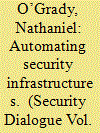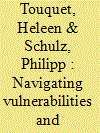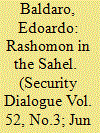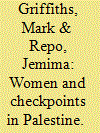|
|
|
Sort Order |
|
|
|
Items / Page
|
|
|
|
|
|
|
| Srl | Item |
| 1 |
ID:
178342


|
|
|
|
|
| Summary/Abstract |
This article contributes to emergent debates in critical security studies that consider the processes and effects that arise where new forms of automated technology begin to guide security practices. It does so through research into public Wi-Fi infrastructure that has started to appear across the globe and its mobilization as a device for warning the public about emergencies. I focus specifically on an iteration of this infrastructure developing in New York called LinkNYC. According to the infrastructure’s operators, the processes that underpin emergency communication have gradually become ‘automated’ to accelerate LinkNYC’s deployment during crises. The article pursues three lines of inquiry to explore the automation of security infrastructure, in turn making three correspondent original contributions to wider debates. First, it unpacks the real-time analytics and platform-based data-sharing techniques cultivated to automate emergency communication. Here, I expand understanding of the new forms of automation now integrated into technologies harnessed for security and their practical effects. These forms of automation, I demonstrate secondly, are situated by those governing into wider imaginaries concerning the transformative promise automation bears. I argue that the proliferation of these imaginaries play a crucial role in justifying and dictating the enrolment of new devices into security. Third, it explores how automation affords private companies the opportunity to exercise discretionary decisionmaking that changes how and when infrastructure should operate during emergencies. Developing this argument, I add new dimensions to debates regarding the political ramifications associated with automation by claiming that automation redistributes authority across the public and private organizations that increasingly coordinate in bringing new technologies to bear in the security domain.
|
|
|
|
|
|
|
|
|
|
|
|
|
|
|
|
| 2 |
ID:
178341


|
|
|
|
|
| Summary/Abstract |
In dominant global conceptions of conflict-related sexual violence, the experiences of male survivors, if attended to at all, have thus far almost exclusively been analysed in terms of vulnerabilities. Drawing on empirical evidence from two different cases (Uganda and Croatia), in this article we argue that essentializing and static generalizations of ‘emasculation’ fail to do justice to the complexity of male survivors’ experiences. We show that, in the two cases we examine, male survivors exercise agency and find different ways of engaging with their harmful experiences. Survivors’ agency is shaped and conditioned by different opportunity structures, and thus largely dependent on local gender relations and constructions of masculinity. To build our argument, we take inspiration from feminist international relations scholarship highlighting the active roles of women and girls as agents within the context of armed conflict, extending such analysis to the experiences of male survivors of sexual violence. By systematically analysing the forms and conditions of the agency of male survivors of sexual violence, we offer a more holistic examination of the dynamics of wartime sexual violence, contributing conceptually and empirically to research both on local/civilian agency in wartime and on conflict-related sexual violence.
|
|
|
|
|
|
|
|
|
|
|
|
|
|
|
|
| 3 |
ID:
178340


|
|
|
|
|
| Summary/Abstract |
In the past decade, food security and nutrition practices have become central in the promotion of resilience in protracted crises. Such approaches have been welcomed by the aid community because of their potential for linking relief and development. Social and political analysts, however, have criticized resilience approaches for failing to consider power relations and because they entail an acceptance of crisis or repeated risk. In this context, regimes of food security and nutrition practices have become increasingly targeted, privatized and medicalized, focussing on individual behaviour and responsibility rather than responsibility of the state or international actors. This article uses examples from Sudan to examine how and why the resilience ‘regime of practices’ has functioned as a form of neoliberal governmentality, and argues that it has created a fantasy in which conflict in Darfur is invisible. This allowed food aid to be withdrawn and removed the need for protection despite ongoing conflict and threats to livelihoods; thus crisis-affected populations have been abandoned.
|
|
|
|
|
|
|
|
|
|
|
|
|
|
|
|
| 4 |
ID:
178344


|
|
|
|
|
| Summary/Abstract |
The African Sahel is a region whose geopolitical dimensions are constantly changing and evolving as a result of new intersections of international, regional and local security dynamics. In this context, various actors have initiated different regional projects in an attempt to reframe the area according to their interests and specific interpretations of security and to impose the form of order that best fits with their goals. The discursive, normative and material struggle about the definition of the region is having obvious effects on security and conflict, furthering regional instability. This article disentangles the different region-building initiatives at work in the area by identifying the four groups of actors advancing a specific project around the Sahel, namely: (1) international security deliverers, (2) jihadist insurgent groups, (3) regional governmental elites, and (4) local communities and populations. In so doing, it explores how the different spatial and security imaginaries advanced by these four collective agents struggle and interact, and shows that the Sahel can be considered the unintended result of a competitive process that is furthering conflict and violence in a shifting regional security system.
|
|
|
|
|
|
|
|
|
|
|
|
|
|
|
|
| 5 |
ID:
178343


|
|
|
|
|
| Summary/Abstract |
The objective of this article is to bring Palestinian women to the centre of a discussion about the gendered dimensions of Israel’s convoluted permit system and checkpoint security infrastructure. Drawing on fieldwork close to one of the largest checkpoint terminals in the West Bank, Checkpoint 300 between Bethlehem and Jerusalem, the article develops knowledge about checkpoints in three important ways: i) as gendered spaces that regulate women’s mobility differently from that of men; ii) as spaces that produce particular embodied experiences for women; and iii) as security mechanisms that disrupt and regulate relations of care. This knowledge builds towards the main argument of the article: Palestinian women’s lives are profoundly affected by Israel’s imposition of permit systems and checkpoints in terms of highly gendered impositions of (im)mobility, embodied experience and relations of care. The research presented here thus makes two wider contributions to research on security to do with how the checkpoint brings the politics of gender and occupation to the fore, and how security infrastructure connects to the politics of care under military occupation.
|
|
|
|
|
|
|
|
|
|
|
|
|
|
|
|
|
|
|
|
|